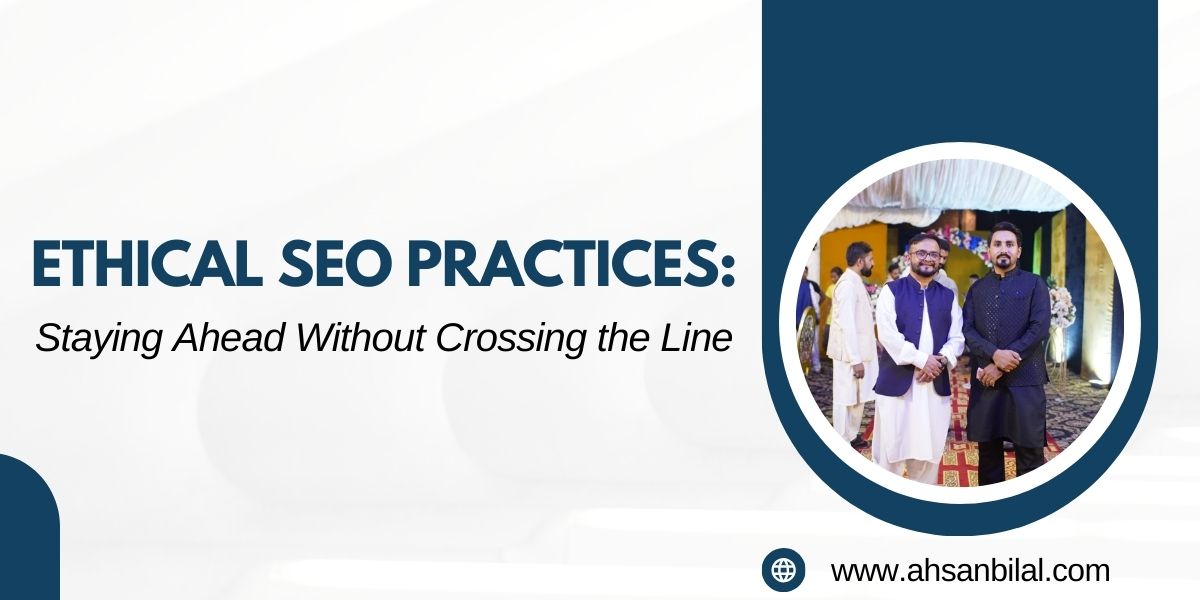Ethical SEO Practices: Staying Ahead Without Crossing the Line
Search Engine Optimization (SEO) has become an essential tool for businesses to improve their online visibility and attract organic traffic. However, in the race to rank higher on search engines, some marketers resort to unethical practices that may deliver short-term results but harm the website in the long run. Ethical SEO practices ensure sustainable growth while maintaining trust with users and search engines. In this article, we’ll explore ethical SEO practices that help businesses stay competitive without compromising their integrity.
What Are Ethical SEO Practices?
Ethical SEO, also known as white-hat SEO, involves using optimization strategies that align with search engine guidelines. These practices focus on improving user experience and delivering valuable content rather than trying to manipulate search engine algorithms.
Unethical practices, such as keyword stuffing, cloaking, and buying backlinks, may yield quick results but can lead to penalties or even a complete ban from search engines. Ethical SEO, on the other hand, builds a solid foundation for long-term success.
Key Ethical SEO Practices to Follow
Create High-Quality, Relevant Content
Content is the backbone of SEO. Ethical SEO starts with creating valuable, original, and engaging content tailored to your target audience. Focus on:
- Addressing users’ search intent.
- Writing in-depth articles that solve problems or answer questions.
- Consistently refreshing substance to guarantee exactness and pertinence.
Avoid duplicating content or scraping from other websites, as it can lead to copyright issues and search engine penalties.
Use Keywords Strategically
Keyword optimization is vital for SEO, but ethical practices ensure that it enhances user experience rather than diminishing it. Best practices include:
- Conducting keyword research to identify terms with high relevance and moderate competition.
- Integrating watchwords normally into titles, headings, and body content.
- Avoiding keyword stuffing or over-optimization, which can make content unreadable and hurt rankings.
Optimize for User Experience (UX)
Ethical SEO goes beyond rankings and prioritizes the user. A seamless user experience encourages visitors to stay longer, reducing bounce rates and increasing conversions. Focus on:
- Ensuring your website is mobile-friendly.
- Improving site speed for quicker load times.
- Making navigation intuitive and easy for users to find what they need.
- Using accessible designs for people with disabilities.
Earn Backlinks Naturally
Backlinks remain a critical ranking factor, but ethical link-building avoids shortcuts like buying links or participating in link farms. Instead, focus on:
- Making shareable substance, for example, blog entries, infographics, or recordings.
- Reaching out to industry websites for guest blogging opportunities.
- Building relationships with influencers or bloggers in your niche.
Search engines value quality over quantity when it comes to backlinks, so aim for links from authoritative and relevant sources.
Avoid Misleading Practices
Honesty is a core principle of ethical SEO. Avoid practices that mislead users or search engines, such as:
- Cloaking: Showing different substance to web crawlers than to clients.
- Clickbait Titles: Crafting headlines that don’t match the content.
- Hidden Text: Hiding keywords or links by matching text color to the background.
Misleading practices may get you clicks, but they damage trust and credibility in the long run.
Leverage Schema Markup
Schema markup, or structured data, helps search engines better understand your content. By implementing schema, you enhance the visibility of your content in rich snippets or knowledge panels. Ethical use of schema ensures you provide accurate and honest metadata to avoid misleading users.
Respect Competitors and Copyrights
Ethical SEO includes maintaining a professional approach toward competitors. Do not:
- Copy content or designs from other websites.
- Use negative SEO tactics to harm competitor rankings. Instead, focus on differentiating your brand through unique value propositions and innovative strategies.
Why Ethical SEO Matters
Builds Long-Term Trust
Users and search engines value websites that prioritize quality and integrity. Ethical practices build a reputation for your brand as trustworthy and reliable, encouraging repeat visitors and loyal customers.
Protects Against Penalties
Search engines frequently update their algorithms to identify and penalize unethical practices. Ethical SEO safeguards your site from penalties, ensuring consistent rankings and traffic.
Aligns with Brand Values
For many businesses, their brand’s credibility and image are non-negotiable. Ethical SEO ensures your marketing strategies align with your core values, enhancing your brand image.
How to Stay Updated with Ethical SEO Practices
SEO guidelines and algorithms are constantly evolving. To guarantee you’re in good shape:
- Follow updates from Google’s Webmaster Central Blog.
- Stay active in SEO forums and communities.
- Invest in training and certifications to refine your skills.
- Regularly audit your website for compliance with SEO best practices.
Conclusion
Ethical SEO is not just about playing by the rules; it’s about putting users first and building sustainable growth. By focusing on quality content, user experience, and transparent practices, businesses can achieve long-lasting results while maintaining their integrity. Remember, SEO is a marathon, not a sprint—staying ethical ensures you reach the finish line without stumbling.
Adopt ethical SEO practices today and pave the way for a brighter, penalty-free digital future.










